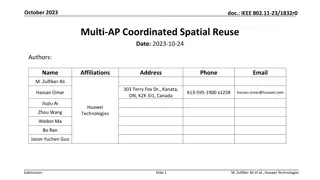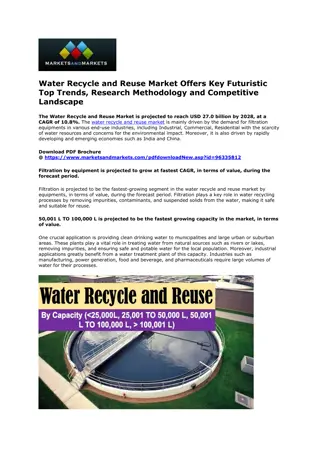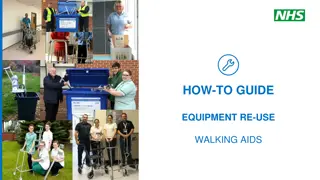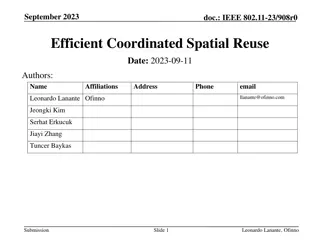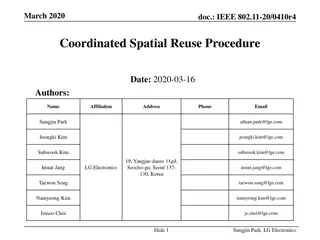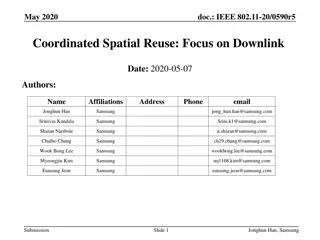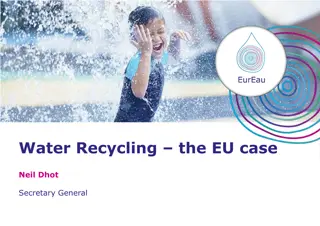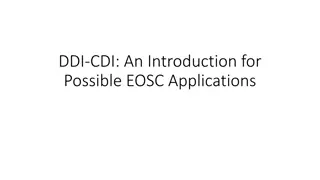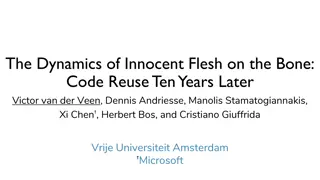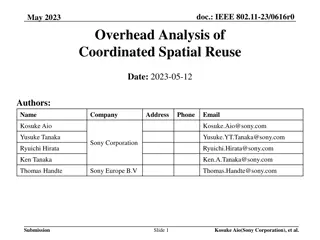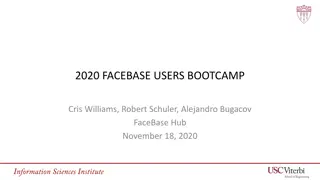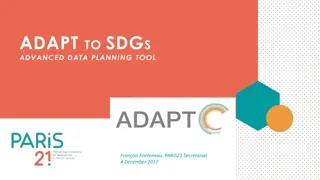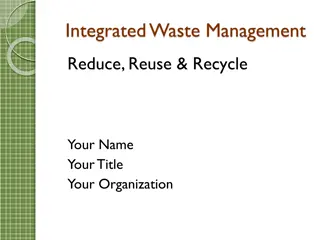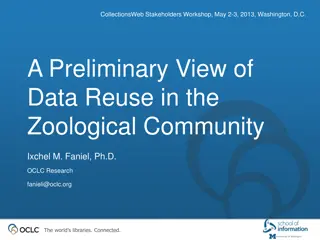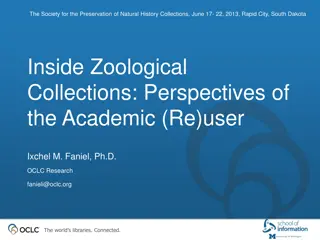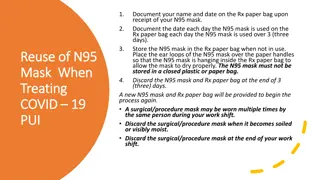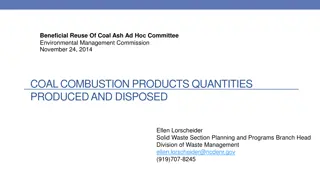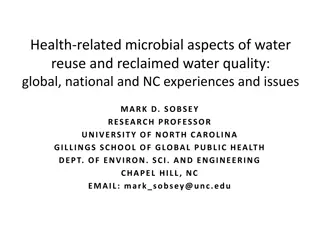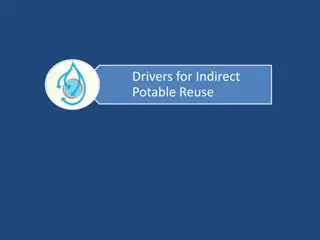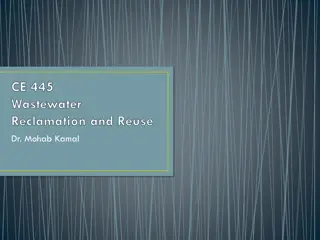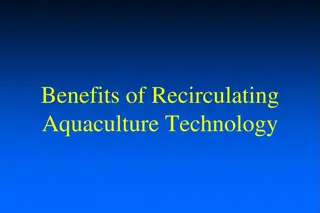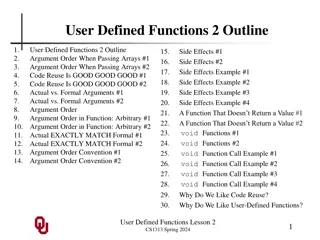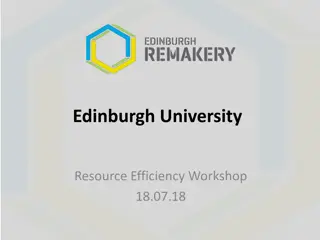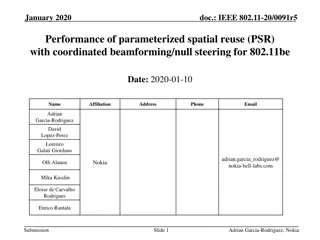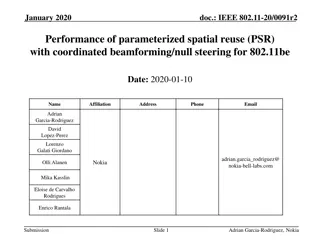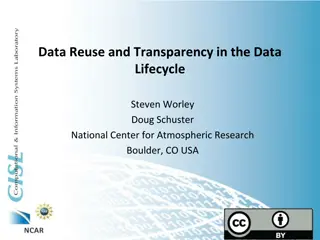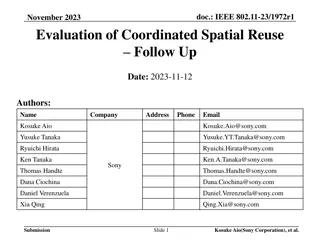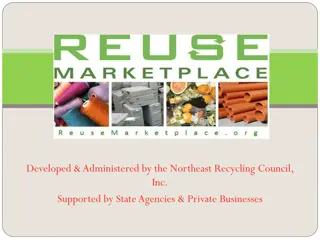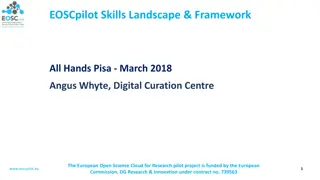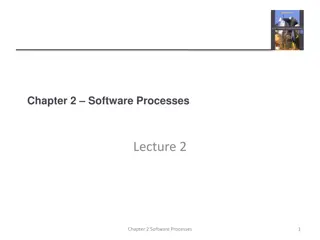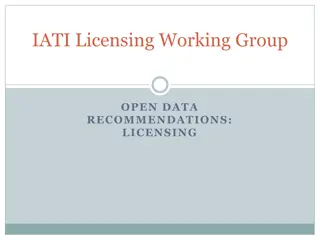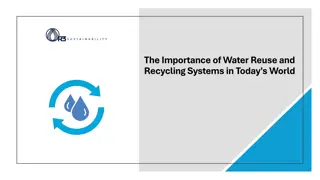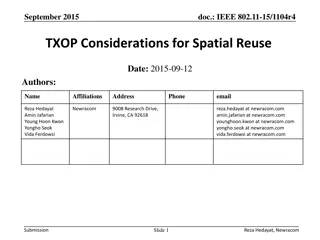Coordinated Spatial Reuse
Explore the concept of Coordinated Spatial Reuse (C-SR) in IEEE 802.11 networks, a scheme where multiple access points (APs) transmit data simultaneously to reduce interference and enhance resource utilization. Learn about the definition, benefits, and necessary components for successful C-SR operat
0 views • 15 slides
Urban Mining and CDW Circular Economy Cost-Benefit Analysis
This case study focuses on comparing the cost and greenhouse gas emissions savings of local processing and reuse of Construction and Demolition Waste (CDW) materials versus sending them to landfills. By developing a prototype cost and GHG savings calculator, the aim is to showcase the potential of e
0 views • 14 slides
Coordinated Spatial Reuse in IEEE 802.11bn Standard
This contribution explores Coordinated Spatial Reuse (Co-SR) as a potential multi-AP feature for the IEEE 802.11bn standard. It discusses the trade-offs, proposes a method for downlink channel access, and evaluates its impact on goodput and packet delivery delay. The background highlights the gains
1 views • 17 slides
Analysis of Power Control for Coordinated Spatial Reuse in IEEE 802.11-24
Evaluation of power control schemes for Coordinated Spatial Reuse (CSR) in IEEE 802.11-24, comparing benefits with and without power control. Results show gains in throughput and SINR with different CSR schemes and considerations for shared access points. Concerns and insights shared on the effectiv
6 views • 24 slides
Sustainable Solutions: Exploring the Water Recycle and Reuse Market
The water recycle and reuse market is projected to reach USD 27.0 billion by 2028, at a CAGR of 10.8% from USD 16.1 billion in 2023. The market growth is driven by factors such as the use of equipments like filtration, Machinery and the increasing demand for the use of water recyle due to the limite
0 views • 5 slides
Reusing Walking Aids for a Greener NHS
Reusing walking aids like crutches, frames, and walking sticks can significantly reduce carbon emissions and waste in the healthcare sector. By implementing walking aid reuse schemes, hospitals can save money, reduce their environmental impact, and contribute to the NHS's sustainability goals. This
0 views • 18 slides
Reusing Phylogenetic Data for Enhanced Visualization and Analysis
Reusing phylogenetic data can revolutionize scientific research by enabling synthesis of knowledge and comparative analyses across scientific disciplines. However, a significant portion of valuable phylogenetic data is lost due to the prevalent use of static images for tree publication. To address t
0 views • 8 slides
Efficient Coordinated Spatial Reuse in IEEE 802.11-23
Coordinated Spatial Reuse (C-SR) is a Multi-AP transmission technique proposed for UHR networks that enhances efficiency by utilizing RSSI or pathloss feedback instead of complete CSI. This document introduces an efficient protocol for C-SR, focusing on a unified approach for better implementation.
0 views • 10 slides
Understanding IEEE 802.11-20/0410r4 Coordinated Spatial Reuse Procedure
This document presents the Coordinated Spatial Reuse (CSR) procedure in IEEE 802.11-20/0410r4, focusing on the transmission schemes and necessary information for effective spatial reuse. It outlines the topology of CSR environments, acquisition of information for CSR, CSR capability announcement by
10 views • 23 slides
Coordinated Spatial Reuse in IEEE 802.11 Networks
The document discusses Coordinated Spatial Reuse (C-SR) in IEEE 802.11 networks, focusing on downlink transmission. C-SR is a multi-AP coordination scheme aimed at enhancing spectrum efficiency by reusing time/frequency resources among multiple Basic Service Sets (BSSs). The procedure is divided int
1 views • 24 slides
Water Recycling in the EU - Addressing Challenges and Benefits
Water recycling in the EU is gaining traction due to the increasing pressure on water resources. Recovered water treated to safe standards has economic and environmental benefits. Despite challenges like costs, it has potential for applications in agriculture and industry. EurEau, representing water
0 views • 13 slides
Data Documentation Initiative (DDI) for Enhanced EOSC Applications
Introduction to DDI-CDI and its relevance in EOSC applications, highlighting examples, foundational metadata, possible applications, questions for consideration, interoperability with FAIR data principles, and challenges in research across domain boundaries. DDI standards aim to improve data documen
0 views • 51 slides
Code Reuse Ten Years Later: A Study on Gadget Finding
This study by Victor van der Veen and team from Vrije Universiteit Amsterdam, along with Xi Chen from Microsoft, delves into the dynamics of innocent flesh on the bone in the context of code reuse. The researchers focus on gadget finding and provide valuable insights through their analysis.
0 views • 94 slides
Overhead Analysis of Coordinated Spatial Reuse in IEEE 802.11-23
Analysis of overhead components impacting the performance of Coordinated Spatial Reuse (Co-SR) in IEEE 802.11-23 standard for wireless communication. Evaluation of MAC overhead, negotiation and measurement phases, and frames in the negotiation phase. Discussion on the impact of overhead on Co-SR per
0 views • 14 slides
Enhancing Research Data Stewardship for Craniofacial and Dental Studies
Explore the comprehensive resources provided by the FaceBase platform for craniofacial and dental research, featuring detailed tours, data organization insights, and a collaborative framework. Learn how the platform facilitates data sharing, boosts reproducibility, and supports a global research com
0 views • 6 slides
Understanding Classes and Data Abstraction in Object-Oriented Programming
Object-oriented programming (OOP) encapsulates data and functions into classes, akin to blueprints for creating objects. This lecture delves into the relationship between classes, objects, data members, member functions, and user-defined types. It emphasizes the reuse and encapsulation of code, info
5 views • 22 slides
ADAPT to SDGs: Advanced Data Planning Tool for Better Localization and Planning
Explore the importance of data mapping for SDGs, utilizing the ADAPT tool to enhance localization and improve data planning. This tool assists in responding to global calls, assessing statistical capacity, and enhancing data system efficiency. Learn how ADAPT aids in identifying gaps, mapping data d
0 views • 18 slides
Effective Strategies for Integrated Waste Management
Learn about the importance of integrated waste management, including waste reduction, reuse, and recycling practices. Discover how managing waste can conserve resources, reduce pollution, and save landfill space. Explore strategies such as source reduction, reuse of products, and making environmenta
0 views • 17 slides
Exploring Data Reuse in the Zoological Community
Preliminary findings from a project funded by the Institute for Museum and Library Services led by Drs. Ixchel Faniel and Elizabeth Yakel delve into the intersection of data reuse and digital preservation in quantitative social science, archaeology, and zoology. The research focuses on identifying t
0 views • 12 slides
Digital Preservation in Academic Research Data Reuse
The Society for the Preservation of Natural History Collections conducted a project funded by IMLS to study data reuse and digital preservation in academic disciplines. The research team explored significant properties of social science, archaeological, and zoological data for effective preservation
0 views • 14 slides
Proper Storage and Reuse Guidelines for N95 Masks and Gowns
Learn about the correct way to store, document, and reuse N95 masks and gowns to ensure their effectiveness and safety. Follow the recommended practices to help reduce contact transmission and maximize the lifespan of these essential protective equipment items. Regular documentation, proper storage
0 views • 8 slides
Beneficial Reuse of Coal Ash Ad Hoc Committee Report
The report discusses the beneficial reuse of coal combustion products, outlining various applications like soil nutrient additives, manufacturing materials, structural fills, and recovery of contained materials. It highlights different types of structural fills and their distribution by county in No
0 views • 12 slides
Understanding Health Risks in Reclaimed Water and Water Reuse
Exploring the microbial aspects of reclaimed water and wastewater reuse is crucial for public health. Pathogenic microorganisms present in wastewater, such as bacteria, viruses, and parasites, can lead to gastrointestinal and systemic illnesses in humans. Proper removal and inactivation of these pat
0 views • 25 slides
Strategies for Sustainable Water Management
Drivers for indirect potable reuse include water stress, population growth, industrial development, droughts, and climate change. Other drivers for water reuse encompass conservation, environmental enhancement, pollution abatement, and regulatory policies. Rising water rates and costs of imported wa
0 views • 21 slides
Design Principles for Water Reclamation and Reuse
Achieving consistent reclaimed water quality requires proper treatment strategies, technical controls, online monitoring, and operational controls. The design principles focus on elements like monitoring, attenuation, retention, and blending to ensure water quality for various reuse applications. Wa
0 views • 22 slides
Advantages of Recirculating Aquaculture Systems for Sustainable Fish Production
Recirculating aquaculture technology offers numerous benefits such as water reuse, minimized water consumption, enhanced biosecurity, and cost-effectiveness. By adopting recirculating systems, aquaculture farms can comply with stricter regulations, address water scarcity issues, and optimize product
0 views • 13 slides
Understanding User-Defined Functions and Code Reuse
In this lesson, we delve into user-defined functions, exploring topics such as argument order when passing arrays, the importance of code reuse for efficiency, and the significance of actual versus formal arguments. Through examples and explanations, we unravel the principles behind creating reusabl
0 views • 30 slides
Promoting Resource Efficiency and Waste Reduction in Edinburgh
Discover how Edinburgh Remakery is leading the way in reducing waste through repair, reuse services, and community support. Engage in their charitable activities, from repair surgeries to workshops, all aimed at fostering a culture of repair and reuse across Edinburgh. Through partnerships with key
0 views • 13 slides
Performance Evaluation of Parameterized Spatial Reuse with Coordinated Beamforming for IEEE 802.11be
The study focuses on assessing the performance of parameterized spatial reuse (PSR) with coordinated beamforming/null steering for IEEE 802.11be. The framework allows coordinated sharing of uplink transmission opportunities among APs, demonstrating gains in synchronous coordinated beamforming system
0 views • 19 slides
Performance Evaluation of Coordinated Beamforming with Parameterized Spatial Reuse in IEEE 802.11be
The document discusses the performance evaluation of coordinated beamforming with parameterized spatial reuse (PSR) in IEEE 802.11be. It explores the practical operation of the 802.11ax PSR framework with null steering and the key implementation benefits, emphasizing unsynchronized operation and ada
0 views • 20 slides
Importance of Data Reuse and Transparency in the Data Lifecycle
Data reuse and transparency play a crucial role in supporting fact-based outcomes for various stakeholders, including scientists, policymakers, community leaders, and commercial interests. By enabling expanded usage beyond intended communities and ensuring reproducibility and traceability, data cent
0 views • 14 slides
Xcache Possibilities and Effective Use in HPC Environments
Xcache, a versatile caching system, offers various possibilities for data transfer, remote access, data streaming, and HPC optimization. The system enables efficient data reuse and provides enhanced data integrity and accessibility features. Explore the potential applications and considerations for
0 views • 7 slides
Evaluation of Coordinated Spatial Reuse in Multi-AP Scenarios for IEEE 802.11-23/1972r1
Evaluation of Coordinated Spatial Reuse (SR) in a 4AP scenario for IEEE 802.11-23/1972r1 in November 2023. The study focuses on improving throughput in multiple BSS environments through coordinated SR. The simulation parameters include AWGN channel, pathloss exponent, noise figure, and other key fac
0 views • 15 slides
Reuse Marketplace - Online Platform for Reusable Items
Discover Reuse Marketplace, an online network facilitating the sharing of reusable and surplus items among businesses, government entities, non-profits, and institutions in seven states. Members can post, browse, and obtain items, promoting sustainability, cost savings, and waste reduction. Explore
0 views • 13 slides
Understanding Competences, Skills, and Stewardship in Research for the European Open Science Cloud
The European Open Science Cloud pilot project aims to link competences, skills, and capabilities for stewardship in research. It explores the connection between competences, capabilities needed by research teams for the EOSC environment, and skills required for open data science. The importance of s
0 views • 19 slides
Decontamination and Reuse of N95 Filtering Facepiece Respirators
This presentation discusses the decontamination and reuse of N95 filtering facepiece respirators, addressing the need for solutions in sanitizing technologies like ultraviolet light and chlorine dioxide. Various methods under consideration, such as heat and hydrogen peroxide, are explored alongside
0 views • 16 slides
Software Development Processes and Challenges
Incremental development offers benefits such as reduced costs, faster feedback, and more rapid delivery. However, challenges like visibility issues and system structure degradation can arise. Reuse-oriented software engineering focuses on systematic reuse for building business systems. Different typ
0 views • 10 slides
Understanding Open Data Licensing and Recommendations
Open data licensing is crucial for ensuring proper use and reuse of information across jurisdictions. This content discusses the need for common license frameworks, the characteristics of open data, types of open licenses, and examples of conforming licenses to promote data sharing and reuse.
0 views • 9 slides
The Importance of Water Reuse and Recycling Systems in Today's World
Discover the importance of water reuse and recycling systems in combating water scarcity, protecting the environment, and supporting sustainable development. Learn how these systems ensure a secure future for our most vital resource.
1 views • 8 slides
IEEE 802.11-15/1104r4: Optimizing CCA Threshold for Spatial Reuse in WLANs
The document discusses considerations for optimizing the Clear Channel Assessment (CCA) threshold in wireless local area networks (WLANs) to enhance spatial reuse efficiency. It emphasizes minimizing over-protection caused by the current CCA rule while addressing factors like frequency reuse, BSS/OB
0 views • 18 slides


